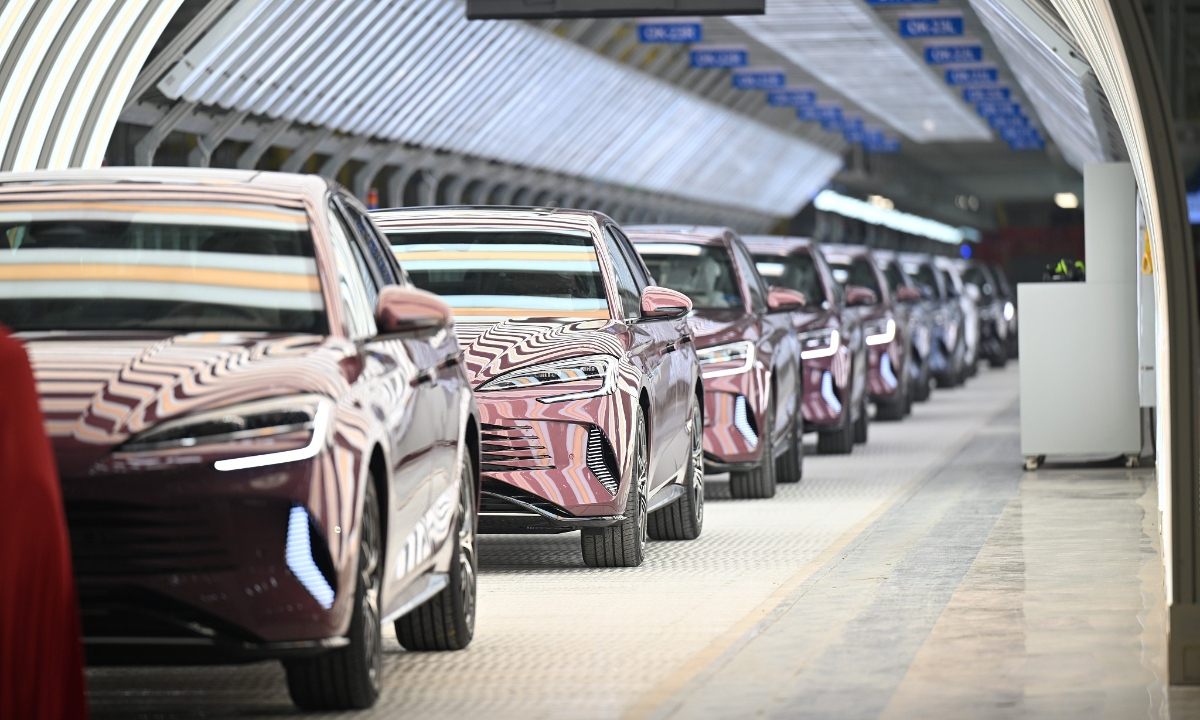
EV Photo:VCG
German auto giant Mercedes-Benz said it considers the European Commission (EC)'s tariffs on Chinese electric vehicles "a mistake that can lead to far-reaching negative consequences," and calls for the postponement of the enforcement of the tariff measures, following a crucial EU vote on the EV issue.
The automaker said in a statement sent to the Global Times on Saturday that it supports a liberal trade regulation based on WTO rules. It called for the postponement of the tariffs, as it believes a solution can be reached through dialogue and negotiation, which takes time.
They added that although some EU member countries have been trying to attract more Chinese investment, the wrong signal sent by the EC in pressing ahead tariffs on Chinese EVs will increase the difficulty of expanding trade and economic cooperation.
The EU held a vote on whether to impose a five-year countervailing duty on Chinese EVs on Friday local time. A statement released by the EC showed that the commission's proposal to impose definitive countervailing duties on imports of battery electric vehicles from China has received the necessary support from EU Member States for the adoption of tariffs.
China's Ministry of Commerce (MOFCOM) on Friday expressed strong opposition to EU's imposition of anti-subsidy tariffs on Chinese EVs, stating that the EU's anti-subsidy case against China's EVs is unfair, non-compliant and unreasonable protectionist practice. The ministry said that China-EU technical teams will continue negotiations from October 7.
On Friday, the China Chamber of Commerce to the EU called for delaying the implementation of the tariffs and prioritizing the resolution of disputes and trade tensions through consultations and dialogue, according to an announcement sent to the Global Times. The chamber also expressed deep disappointment with the voting outcome and voiced strong dissatisfaction with the EU's adoption of protectionist trade measures.
Mercedes-Benz said it is convinced that countervailing duties impair the competitiveness of the industry over the long term, and free trade and fair competition ensure prosperity, growth, and innovation. Measures that affect a trading order based on WTO rules, which is beneficial to all parties, should be avoided urgently, it added.
"Now more than ever it is crucial that the EU and China remain engaged in dialogue and reach a negotiated solution that is of mutual interest. We are convinced that there can be such a solution," it said.
The company's statement came amid rising opposition voices in Germany as well as in EU over the EV tariffs.
Germany, the EU's largest economy, voted against the proposal, Reuters reported.
Oliver Zipse, CEO of German auto maker BMW, described the vote as "a fatal signal for the European automotive industry" and called for "a quick settlement between the EC and China to prevent a trade conflict from which no one gains," according to Reuters.
Zipse said the fact that Germany voted against the tariffs is an important signal and increases the chances of a negotiated settlement.
The China Council for the Promotion of International Trade (CCPIT), China's trade promotion agency, announced on Saturday its firm opposition to the EU's imposition of countervailing duties on Chinese EVs.
The CCPIT stated that the European side ignored the strong momentum of China-EU cooperation in the electric vehicle industries, disregarded facts and standard investigative procedures, and refused to correct its flawed determinations.
Cui Hongjian, a professor at the Academy of Regional and Global Governance at Beijing Foreign Studies University, told the Global Times on Saturday that the EU's actions highlight growing trade protectionism within the bloc. The reaction to the vote once again demonstrated the divergence in thinking between the EU bureaucracy and some of its industries.
"The vote reveals a trend in EU politics where politicians are increasingly bold in disregarding the voices of EU industries in pursuit of political objectives," Cui said.
The CCPIT also emphasized its commitment to supporting China and the EU in properly handling differences and resolving frictions through dialogue and consultation, working toward a solution that aligns with WTO rules and serves the common interests of both parties.
Global Times

